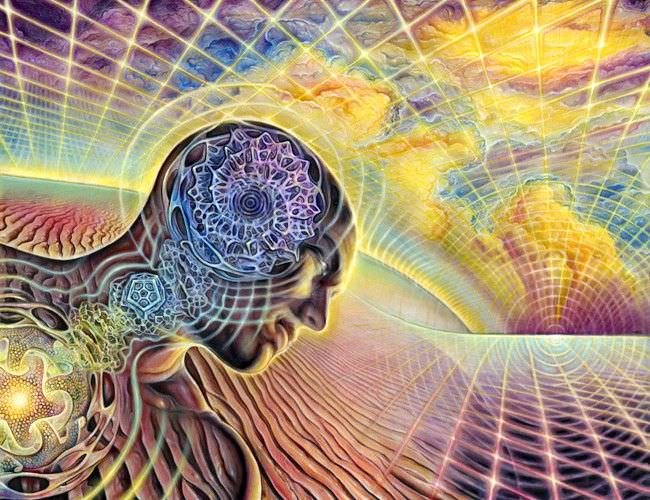
Changing the Dialogue of Psilocybin Mushrooms with Science
I’ve been writing about the effects of psilocybin cubensis, and how they’ve become a key component to my PTSD healing process, my post-Marine life. How they’ve helped shine a light through the gloom of depression that’s darkened my way. How it’s shoved back the anxiety holding me back from a fulfilled life. I can talk, and talk, and talk about how great mushrooms are, espouse all their life changing benefits. Gush about how the universe reached out with star-crusted hands, snatched me up, then whisked me away into the cosmos, lunar sailing in the confines of a psilocybin spaceship.
But is that good enough, just to talk about it…? To rant? To jump up and down, yelling, “Look at me! Look at me!”
The short answer. No, no it isn’t.
Instead, I’ll be exploring the science behind the Trip, and how psilocybin cubensis can be an effective alternative for treatment-resistant mental health diagnoses. And, how science is proving, study after study, that psilocybin mushrooms have every right to be looked at as a viable alternative that belongs in the tool box of mental healthcare applications.
Changing Thoughts and Minds
To tackle the preconceived notions of psychedelics, like mushrooms, is to understand the erroneous misconceptions that plague them. It’s understanding that psilocybin cubensis, more commonly known as “magic mushrooms, shrooms, gold caps,” are illegal. Like cannabis, The DEA classifies it as a Schedule I drug, meaning:
- There are no “currently acceptable” medical uses in the United State.
- Thought to have a high potential for abuse or addiction. (Just my two-cents. I personally know more people addicted to alcohol, nicotine and opioids then psilocybin or cannabis.)
- There is a lack of accepted safety for use of the drug or other substance under medical supervision.

But is this warranted? And what does science have to say about this all?
A lot, it turns out, and most of it positive. So it’s time to start rethinking outdated, old-world views of government drug policy and classification systems. It’s time to correct the slew of misinformation floating around the internet, the exaggerated views of psychedelic use as portrayed by the media.

Image Credit Dude, like, I'm listening to my bowling tapes, man.
Most of those misconceptions on what mushrooms are usually has something to do with the stereotyped groups that use them – hippies, deadbeats, lazy people -- the “stoner” culture. There’s still this very juvenile view of mushrooms, reinforced by pop-culture blandness and narrow minds. (An article for another time.)
While the dialogue of cannabis is slowly changing, the dialogue of psychedelics still seems firmly planted in erroneous mischaracterizations, misplaced fears and plain ol’ ignorance.
So where does that leave someone like me, or people in the same boat I’m in? People who’ve dealt with the dark delirium of PTSD, or depression, or anxiety, but are resistant to modern, mainstream modalities and medications that don’t do much--or worse--make you feel more detached from yourself, from life. And believe me, I’ve run the gamut of mental health obstacle courses, from a month-long stay in a psychiatric hospital, to intensive outpatient therapy, to the endless march of prescription medications the VA all-to-willingly dishes out.

I’m not a hippie. And even though I can relate to the “stoner” culture, I still wouldn’t necessarily consider myself a part of it. I’m a warrior, with a warrior mentality. I’m a Marine, a combat veteran. I’m active, stay in shape. I have high-reaching ambitions, clear-ish goals laid out before me. I’m not a broken, misshapen human warped by war, by combat. I am Human, just like you, hanging onto this roller-coaster ride called life.
Nobody likes being stereotyped, so stereotypes be damned. But how do you start changing minds? How do you start shedding much needed light on a misunderstood topic? How do you start the discussion on the mental health benefits of a mushroom classified in the same category as heroin or methamphetamines?
You dive into the science of it, that’s how. Share the research being carried out, as I type this, by doctors, psychologists and scientists who are willing to think “outside of the box.” But I also want to weave this academic narrative within my own experiences, bringing it down to a personal, relatable level.

The Multidisciplinary Association for Psychedelic Studies, or MAPS for short, is a non-profit based in California, and has been spearheading this change in perception towards psychedelics for some time, since 1986 to be exact, with a mission to: “Research, educate, develop, medical, legal, and cultural contexts for people to benefit from the careful uses of psychedelics and marijuana.”
I’ve experienced positive, life-changing effects with mushrooms. I’ve experienced a sense of empathy I haven’t felt for… awhile. I’ve become more engaged with my surroundings, in my personal relationships. And it’s provided a pathway for continual healing. But I’m not a doctor. Not a scientist. Not even an academic. I know my word alone can only carry me so far. So, let’s get started, shall we?
Lifting the Veil: Science!

With curiosity as my guide, I was pursuing over the studies published on psilocybin, when I came across this 2012 study, “Implications for psychedelic-assisted psychotherapy: functional magnetic resonance imaging study with psilocybin,” published in the British Journal of Psychology. And that piqued my interest.
In this study, researchers wanted to examine the rationale for psilocybin being used to “aid emotional insight by lowering psychological defenses.”
Their aim was to, “Test the hypothesis that psilocybin facilitates access to personal memories and emotions by comparing subjective and neural responses to positive autobiographical memories under psilocybin and placebo.”
They wanted to know, based on the direction and findings of previous research, if psilocybin aids/enhances memory recall while lowering the mental barriers we build up over our memories. The “walls” we humans use to insulate ourselves from further trauma. Here’s what they found.
Their Methods (Paraphrased)
For the experiment, 10 healthy participants were tested. After enrolling in the study, each participant had two-weeks to provide thirty or more positive personal memories -- specific life events -- for use in the experiment. Each memory was given an auditory queue, a short phrase, like, “standing at the altar for your wedding.” Participants then took part in two fMRI scanning sessions, (fMRI stands for functional magnetic resonance imaging, meaning, brain activity is measured by detecting changes associated with blood flow), with 7 days between each scan.
At each session, participants viewed two different sets of 15 positive memory cues. They viewed each for 6 seconds, then closed their eyes for 16 seconds, reimagining the experience. The 16-second portion was split into two phases; the first 8-seconds were an “early-activation phase,” the last 8-seconds were a “late-activation phase,” in order to compare measurements of brain activity at the beginning and end of each memory. Also, at each session, a 2mg intravenous solution of psilocybin or saline-only solution was administered during scanning. The participants did not know which they received.
Results. Results. Results
In one test, after participants exited the scanner, they were asked to rate not only the vividness of each memory on a scale of one-to-ten, but also the emotional intensity, the valence (the positivity of the memory), and the visual intensity of the imagery when their eyes were closed. Researchers found that memories were rated as more visual, vivid, positive and emotional under psilocybin as opposed to the placebo.
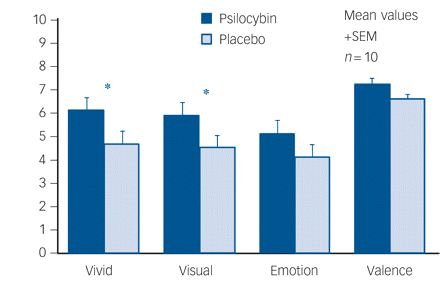
Chart 1 Memory ratings after psilocybin and placebo. Ratings were significantly higher after psilocybin than placebo for the items ‘How vivid was the memory?’ and ‘How visual was the memory?’ (two-tailed t-test, *P<0.05) and when all four were grouped (P = 0.0003).
Activation to Memories
When measuring memory activation with the fMRI scans, (image below), researchers noted: “Robust activations were observed during cued autobiographical recollection v. rest under both placebo and psilocybin…”
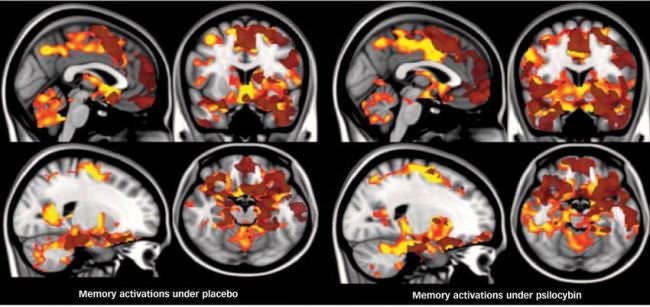
Fig 2. Early phase (first 8-seconds) activations shown in orange, late phase (last 8-seconds) shown in red.
Though, they go on to further state: “…But there were additional visual and other sensory cortical activations in the late phase under psilocybin that were absent under placebo.”
Researchers noted that “late activations (under psilocybin) were seen in limbic regions (amygdala), paralimbic regions, and the temporal pole, but there were also large activations in the medial prefrontal cortex and frontal pole that were notably absent in the early recollection period.”
There’s a lot of technical jargon here. So, to understand why this might be important, is to understand what these parts/regions of the brain do, in plain English. Let’s learn some brain stuff!
- First, the amygdala is shaped like an almond. (Is it a coincidence that almonds are considered one of the best brain-health foods…)? It plays a significant role in producing emotional responses like fear, desire, sadness, and how we respond to our environment and others around us, and is also responsible for passing along all this sensory information to other regions of the brain. It’s part of the limbic system, a “house” in our brain where emotions are kept, and, is a key component in processing those emotions as well as motivations, while also playing a large part in the formation of memories.
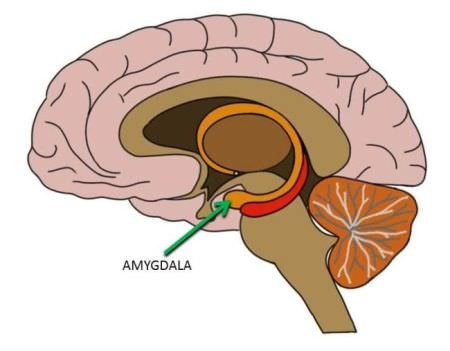
- The paralimbic regions of the brain have to do with emotional processing, goal setting, motivation and self-control.
- The temporal pole is part of the temporal lobe, which is involved in processing sensory input and the formation of long-term memory.
- Researchers (from previous studies) have indicated the prefrontal cortex plays an integral link between a person’s will to live and personality, and plays significant roles in a person’s ability to plan complex cognitive behavior, personality expression, decision making and moderating social behavior. The frontal pole, while not entirely understood, is thought to act in the same way as the prefrontal cortex, and is thought to also be involved in memory recall.
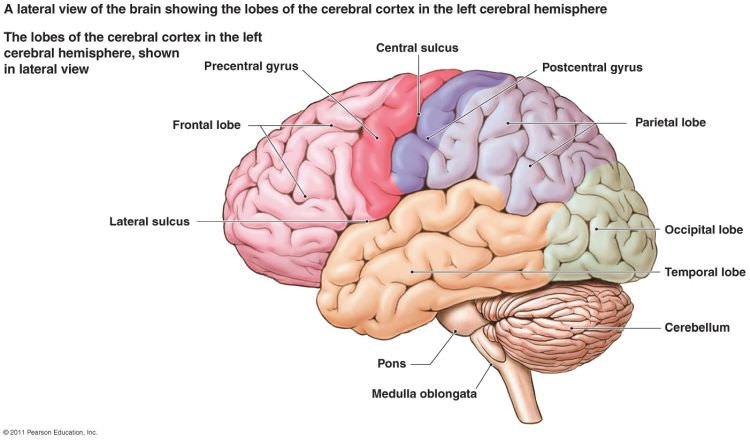
In the graph below, researchers combined data from each participants’ two scans, showing a positive relationship between emotion and vividness scores with psilocybin, and “late-phase” activation, stating, “Late-phase parahippocampal activations correlated positively with how emotional the memories were.”
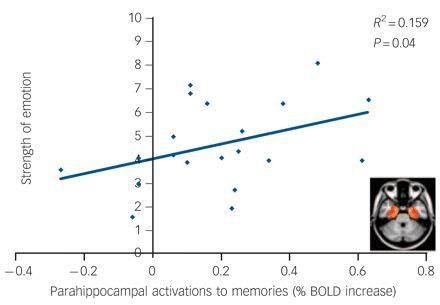
The Parahippocampal is a grey-matter region of the brain that plays a key role in memory encoding, and retrieval. Encoding is the brains ability to interpret sensory input, (sights, sounds, tastes), allowing us to understand, thus, store it away into short or long-term memory, to be called upon, or retrieved, when needed.
Well Being
Two weeks after the scans, researchers found that the subjects reported a “significantly” higher sense of well-being after receiving psilocybin during their scan as opposed to the placebo, as shown in the graph below. (Again, participants were unaware which they were receiving.)

Fig. 4 Significant positive correlation between ratings of increased well-being post-psilocybin and ratings of memory vividness.
Research Conclusions
The researchers concluded, “Evidence that psilocybin enhances autobiographical recollection implies that it may be useful in psychotherapy either as a tool to facilitate the recall of salient memories or to reverse negative cognitive biases…”
Further stating, “…We propose that psilocybin may be used in combination with cognitive strategies designed to reverse cognitive biases in depression – and we also suggest that it may be used in more classic dynamic therapy to assist the exploration and understanding of salient emotional themes.”
How This Applies to Me and My Journey, and How It Could Apply to Yours

Image Credit ...But, what does it all mean?
Now, let’s see if I can weave this into the context of my own experiences.
In the study, the researchers stated that they purposefully used positive imagery to negate any possible negative reactions. So, this experiment was simply testing a theory that, when queued with specific, “life-altering” memories under psilocybin, psychological barriers will/should melt away, allowing a simultaneously immersive and objective look at past trauma, while at the same time, feeling like that memory is occurring, or has occurred quite recently. And even though not enough time was given (16-seconds) to fully develop the memory recall, researchers believe the significant late-activation within the brain under psilocybin indicates that, with more time, the experience would continue to become even more vivid, with even more recollection.
So, while they theorize that psilocybin can facilitate an easy jog through memory lane, I can answer it with my own experience, from my most recent journey down the psilocybin rabbit hole. (November 4th, 2017.)
It was two-or-so hours into my Trip, when a memory surfaced that I’d completely forgotten about, a memory from my younger days. I was at Boy Scout camp, maybe 10 or 11. It was summertime, and I was swimming in a lake, near this long, floating dock that I’d jumped into the water from. I dove under, did some somersaults, then swam down to the bottom to feel its murkiness. Running out of breath, I swam back to the surface, fully expecting to come back up. But I didn’t.
Instead, my head smacked the bottom of the dock hard enough to send starbursts of light behind my clenched eyes. I was already out of breath, so I panicked. Frantically swimming backwards, I kicked my legs, flailed my arms, desperate for air. My head dragged against the bottom of the dock. Dragging and dragging, and dragging.
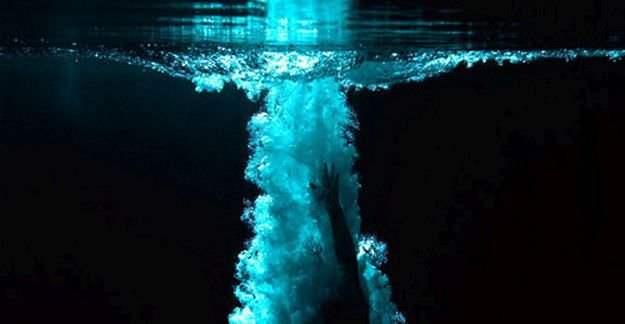
Still-life images of my existence played out in my mind’s eye. Each fading, colliding memory looked like smeary oil paintings. Then the paintings turned to bright pin-points of kaleidoscope light. I couldn’t breathe. I couldn’t yell. There was only the suffocating weight of watery silence. I even had enough self-awareness to know that I might be dying. And that terrified me.
But I didn’t. I finally came up above the water, gulped in the warm summer air. Still in shock, I was able to swim to the shore, weak and shaking, then sat there for a while, watching life continue like all was well. I never did tell anyone…
And I was able to remember all of this during that trip, 26-years later. Then, with psilocybin intensity, that memory struck out across my psyche, like a bolt of lightning, connecting with the memory of one of the most intense firefights I’d ever been in. Another near-death experience. But neither memory scared me. Gone was the panic and anxiety. The fear. Instead, as I relived those memories in that Trip, that memory recall, I simply studied them, curious, like when you’re studying the intricate veins and lacework of a decaying leaf in the Fall. Spinning it slowly in your hands.
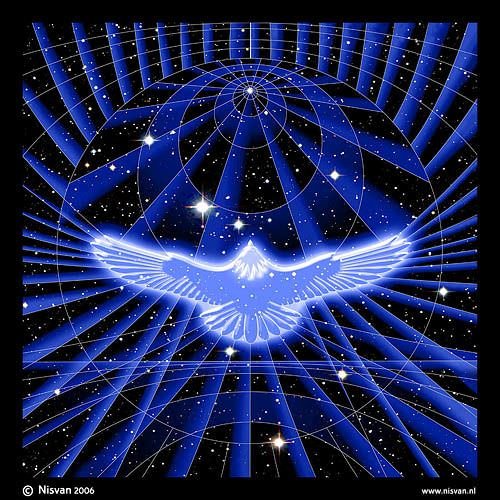
When you’re in the grips of a psilocybin flight, you’re able to look down at these life-changing events, and realize, at the most fundamental level, they can no longer hurt you, even as they try latch on with slimy tentacles. Your wings hold true. Three hours into that trip, I recorded my thoughts on my phone, and stated something I didn’t even really mean to say. I said that I’d just felt like I’d breached the surface of the water, because I was suffocating in my depression, and the feeling was incredible. Like being reborn…

I’ve never taken a medication with the ability to do things like this. I’ve never had a therapy that’s given me such profound insight, such clear recollection, without fear. There’s a lot more to psychedelics than society gives them credit for. And while our country wrestles with its own mental health dilemma, with depression and suicide being far higher than they should be, we need to start opening ourselves to other possibilities. Psychedelics being one of them. You don’t have to take my word for it, you don’t even have to believe me. But thankfully, I have science on my side…
Until next time, fair skies and calm seas.
Reference List:
“Implications for psychedelic-assisted psychotherapy: functional magnetic resonance imaging study with psilocybin.” R. L. Carhart-Harris, PhD, R. Leech, PhD, T. M. Williams, MD, D. Erritzoe, MD, N. Abbasi, MD, T. Bargiotas, MD, P. Hobden, PhD, D. J. Sharp, MD, J. Evans, PhD, A. Feilding, R. G. Wise, PhD and D. J. Nutt, MD. British Journal of Psychology, 2012, Vol 200, Issue 3.
Gibb, Barry J. (2007) The Rough Guide to the Brain. 1st edition. Published by Rough Guides Ltd. London. Distributed by the Penguin Group.
https://en.wikipedia.org/wiki/Amygdala
https://en.wikipedia.org/wiki/Prefrontal_cortex
https://en.wikipedia.org/wiki/Brodmann_area_10
https://en.wikipedia.org/wiki/Parahippocampal_gyrus
https://www.mayfieldclinic.com/PE-AnatBrain.htm
Well said!
One of the main set backs here in America is being stuck with antiquated thoughts and actions instead of going beyond the borders and looking at what Eastern or ayurvedic, TCM can offer and most of the Drs in America will not even discuss using natural herbs for healing.
Thank you. You are right. I can't even discuss any of this with my VA counselor, even though he is a supporter of psychedelic and cannabis-assisted therapy. The more people open about alternatives, the more positive changes we'll hopefully see.
Yup, ya have to understand who is funding/controlling the medical schools to know who is behind it all.
Their license to practice medicine can and will be yanked if they go beyond "food supplement" instead of using a herb to heal the body.
Matt, you're going to win steemit with these types of posts!! May the force be with you! Yes! Love mushrooms
I was really looking forward to hearing about your "lunar sailing in the confines of a psilocybin spaceship..."
BUT this was an equally fantastic topic. I fully agree with you here. We're just at the beginning of unlocking some major potential within the healing space.
I went to Peru last year to experience ayahuasca and there's just an incredibly different healing philosophy down there. For one, they value the exploration of the deep unconscious realms and see them as very necessary aspects to confront when you're physically or mentally ill. Secondly, it's just a profoundly intelligent experience (as you know) and something very much needed in our world.
I really appreciated the studies you shared here and thorough explanations. The truth will continue to show up until it is impossible to avoid.
Expand Your Options, Expand Your LifeThank you for sharing @therightsideofup! I'd love to hear your thoughts about my recent post:
Ha! Yes, the spaceship. You know, I am actually working on a trip report, but I want to include the science behind that as well. I think that'll my next article in terms of psychedelics. I have heard so much about ayahuasca! Thank you for your insight. I agree with you that Eastern vs. Western ways of dealing with health are so vastly different. The Western way is very sanitized and compartmentalized. The connection to each other, to nature is sorely lacking. Going to check out your post!
Yes its mechanistic and logically oriented, while psychotropics are anything but that. They can be distributed mechanistically and logically, but the process is far from that!
Looking forward to more of your stuff! Following ;-)
I have so much that I want to praise about this post! These references to current peer-reviewed publications are undervalued too often, surprisingly in a societal climate of misinformation. As a degree holder in psychology and related medical fields as well as a teacher to people outside or entry-level to healthcare/neuroscience, I am very impressed with your skilled translation of that lovely jargon.
You have provided me a connection to MAPS that I had not sought for myself and am regretting having not before now. I am motivated to pursue additional information about becoming a psychedelic researcher. I found my way to this article written by a professor from my alma mater on the subject a while ago was telling of the academic climate 20 years ago. I am hopeful that among the people in the country that are reporting increasing support into pursuit of additional research are professionals that are then going to work on said research.
Perhaps the popularity of the concept of decentralizing could lead to higher levels of peer-to-peer reviews without the additional pressures from larger institutions to pursue "more traditional" treatment research?
First of all, thank you for the incredibly kind words. I am not an academic and have never written a post/article like this before, and really only started writing about three years ago. (And I owe it to psilocybin mushrooms for the reason why I started writing!) I am glad to bridge some links and hopefully lit a fire. For me, it's not enough to simply talk about the experience, but to add the weight of research and science into it all. There is an abundance of well-crafted psychedelic experiences floating around, but, I think when you include the science, and connect it with the spiritual experience, the insights psychedelics bring, well then that takes it to the realm of being taken a little more serious. I only have my experience to write about, and I know that's not always good enough. My goal in stepping out to talk about psychedelics is to do just that, motivate the thinkers; the doctors, the scientists, the degree holders like yourself, to take this area of study seriously. I do think the narrative is changing, slowly, but it is changing. Cannabis is becoming more culturally acceptable across the board. Psychedelics, while still very misunderstood, is undoubtedly experiencing a "renaissance" in thinking, mainly because Silicone Valley types are enjoying the benefits of microdosing psilocybin.
this site goes beyond the common.An awesome site to research on the global level of any herb/fungus etc is https://scholar.google.com/scholar?hl=en&as_sdt=0%2C44&q=psilocybin+mushrooms&btnG=
Thank you!
Well done! This is an EXCELLENT post! Have you heard the great news? http://www.maps.org/pineapplefund MAPS Received $1,000,000 in Bitcoin from Cryptocurrency Philanthropist!! I love MAPS. They are on the forefront of some of the most revolutionary research in our time.
Thank you for taking the time to read it. And yes I did! I follow MAPS over on Facebook. They are one of the most reliable sources of all things psychedelic. There is plenty more of these articles on the way. Currently putting together a post on psilocybin and how it reduces fear, and how reducing fear leads to breakthroughs.
Wonderful! I resteemed this post. I am very excited to read you posts. Cheers!!
I love hearing a first hand account of your experience. I have been reading a lot of the research, but this makes it so much more meaningful to me to hear how it has helped you. It is so exciting what MAPS is doing! I hope you continue your healing journey successfully. Upvoting and following.
I'm glad you enjoyed it! I think it's important to make these kinds of experiences relatable. So people who may not know much about psychedelics understands that there's more to it than party favors. Nature has given us everything we need.
@originalworks
To call @OriginalWorks, simply reply to any post with @originalworks or !originalworks in your message!